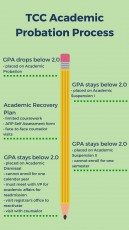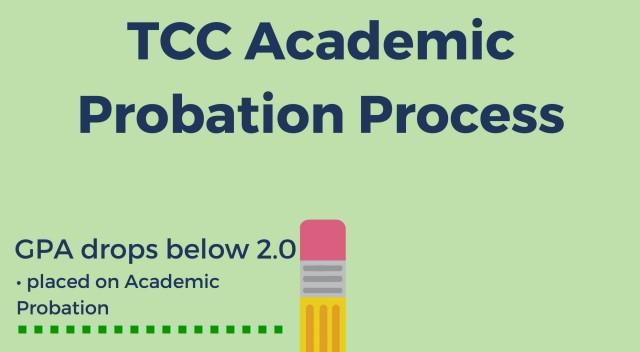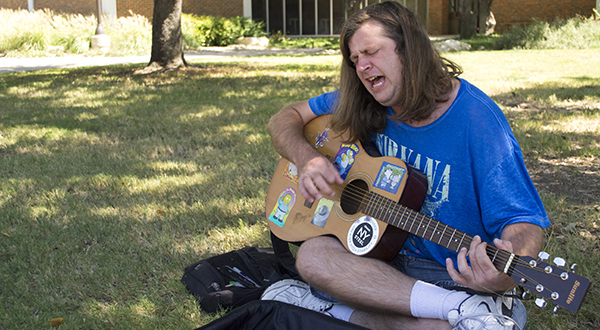By Larraine Lee/ reporter
In college, academic status is determined by a student’s grade point average. Many students juggle classes with work and family to earn a degree. Because those outside obligations require most of students’ time, studying isn’t always at the top of their priority list.
Students with a cumulative GPA below 2.0 are placed on academic probation but may continue to enroll in classes during their time on probation.

Moreover, if the GPA is still below 2.0 while on academic probation, they will then be placed on Academic Suspension I. There are two options in this status: the Academic Recovery Plan, which allows the student to remain in school or choose not to enroll for one long semester including the summer. When students come back after their one long semester break, students will still have to go through the Academic Recovery Plan.
“For instance, if a student fails in the spring semester, then they cannot enroll in the summer and fall,” said NE counselor Masika Smith. “Likewise, if a student fails in the fall semester, they do not get to return until the following fall.”
Students who want to boost their GPA should opt for the ARP. It includes a questionnaire that allows the readmission of any student placed on Academic Suspension I and is offered by the advising and counseling center.
The ARP requires students to complete the questionnaire along with the Academic Recovery Self-Assessment form, enroll in limited coursework and meet with a counselor face-to-face at least twice a semester – usually early in the semester and before mid-terms – to assess the student’s progress. Depending on each student’s situation, frequent sessions with the counselor may be required to help the student get back on track and on the path to academic success.
The ARP requires the student to “attach a one-page typed letter outlining what hindered your academic performance during your first time at TCC, what has been done with time away to address those issues and how will academic performance at TCC be different upon return,” Smith said.
Returning Suspension I students must consult with a counselor when they return to complete the ARP and will remain on suspension until a cumulative GPA of 2.0 or higher is achieved.
After returning to school, if for some reason a 2.0 GPA was not obtained for that semester, the student will immediately be placed on Academic Suspension II – the second warning before any student is given Academic Dismissal.
It is mandatory for Academic Suspension II students to not enroll in any courses at TCC for one long semester including the summer and to meet with a counselor when they return to complete the ARP.
All returning Suspension II students will remain on suspension until a cumulative GPA of 2.0 or higher is achieved. Failure to meet a 2.0 GPA for that returning semester will result in a student being moved to Academic Dismissal.
Students with an Academic Dismissal status are not allowed to enroll in any courses at TCC for one calendar year. Once that year is over, all returning students on Academic Dismissal must first visit with the vice president for academic affairs for readmission to that campus. After they return, students must also visit the registrar’s office for the reactivation of student records and consult with a counselor for the development of an ARP.
NW student Ashley Hays and the mother of 4-year-old twins works three jobs bartending, catering and serving. She has been attending TCC intermittently since 2008 and admits, “Life gets in the way, which is unfortunate, but it’s definitely taught me valuable lessons in learning how to prioritize.”
Students with a previous academic history at TCC who are receiving financial aid but did not meet the minimum standards of having a 2.0 cumulative GPA or higher or failed to complete 67 percent of credit hours will receive a warning.
Students are still eligible for financial aid, but the minimum criteria must be met by the end of the next semester.
Students who fail to meet a cumulative GPA of at least 2.0 or 67 percent of hours completed toward an active academic program within two semesters will automatically be ineligible for financial aid.
This also goes for students who withdrew from courses, “received grades of all F’s, all NCs (not completed) or a combination of W’s (withdrawals), F’s and NCs,” said Joe Rodriguez of the NE financial aid office.
Hays raised her GPA to 3.0 in two semesters.
“I was pretty proud of that — then this last semester I ruined everything I worked so hard for,” she said.
Hays lost her financial aid a second time after she moved into her first home after always living in apartments, a goal that she had since the birth of her children.
“Being a first-time home renter, there were several bills and obligations I was unaware of that are not part of renting an apartment,” she said. “It took a toll on me financially, mentally, physically. I was having to work double the hours to get caught up, which made me depressed because I felt like I never got to see my kids.”
She was also at odds with her mother who was disappointed in her for missing class.
“I was skipping class because it was literally my only chance to get at least four hours of sleep and then to spend the morning with my kids before heading to work again,” Hays said.
Students who experienced distressing circumstances during the recent semester can reinstate their academic eligibility for funds by submitting a typed letter to the student financial aid office on the campus where they will enroll. Circumstances can include job issues, changes in a student’s major, personal sickness or death of a family member.
Like Hays, many students with several jobs and children – especially single moms – have lost their financial aid.
“The first time I stopped going to school was when I was pregnant because I had a miscarriage with a triplet and was put on bed rest, so that semester was shot,” Hays said.
In the typed letter, students must outline the circumstance that prevented them from achieving academic progress standards, steps that will be taken to overcome those circumstances, action to ensure they remain eligible for financial aid and long-term educational goals they hope to achieve.
“I haven’t inquired because this will be the second time I’ll be asking to have it reinstated, and I don’t know if they will approve it,” Hays said. “I’m considering requesting a reinstatement again if it is allowed.”
Hays advised students who face similar issues not to overload a schedule.
“It feels good to accomplish your goals, but if you have one or two and you fulfill them to the fullest, it’s much more rewarding than trying to balance five or six and only giving it half of what you’re capable of,” she said. “If that means one or two classes a semester instead of five, then so be it. It’s worth it in the long run for your degree and your sanity.”
Equally important for her, she said, is “a good support system. Don’t hang around people who don’t share your passions or have similar views toward your education or they will bring you down.”






















